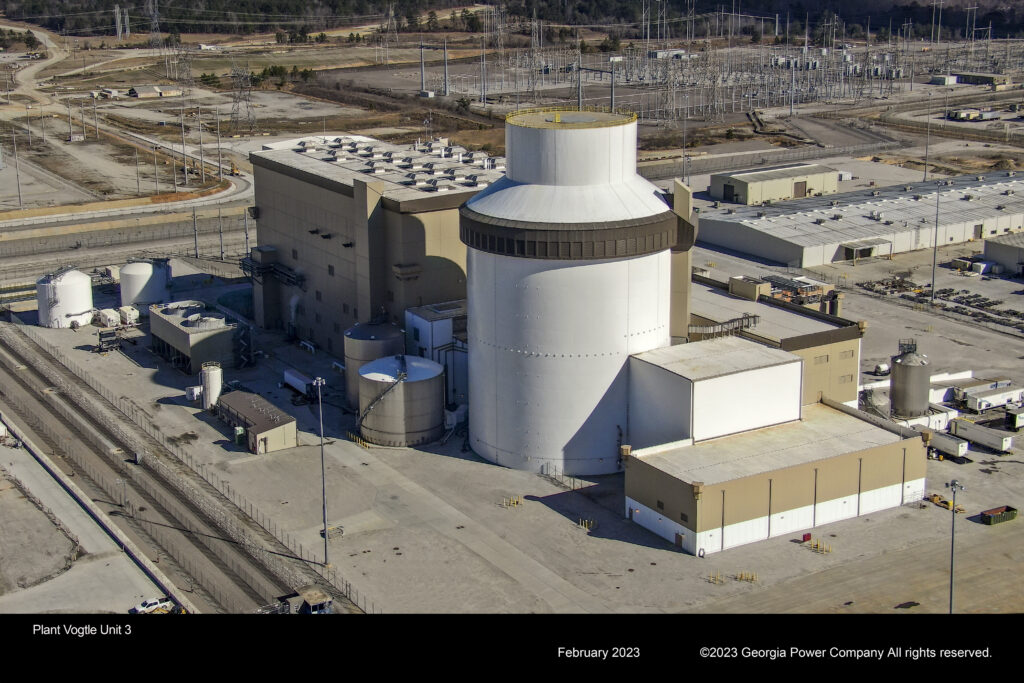
ATLANTA – The final stage of the nuclear expansion at Plant Vogtle has produced an unusual twist in the back-and-forth between Georgia Power, state energy regulators and the environmental and consumer advocates who act as watchdogs.
The long-delayed, overbudget project has managed to split groups that for years have opposed the construction of two additional nuclear reactors at the plant south of Augusta as a boondoggle.
Some environmental and consumer groups have signed onto an agreement Georgia Power reached in August with the state Public Service Commission’s (PSC) Public Interest Advocacy Staff letting the Atlanta-based utility recover from customers nearly $7.6 billion of its 45% share of the project’s cost.
“While project delays and overruns do mean Georgians will be paying for this project for decades, Georgia Power agreed to significantly lower the construction costs they were expected to pass on to customers,” Bob Sherrier, a staff attorney with the Southern Environmental Law Center (SELC), said at the time.
Besides the SELC, other groups signing onto the agreement included Georgia Interfaith Power and Light, the Partnership for Southern Equity, and the consumer advocacy organization Georgia Watch.
But other advocacy groups are so incensed over the agreement that they took out a full-page ad in The Atlanta Journal-Constitution late last month urging the PSC not to hold “prudency” hearings on the project until after the next commission elections. The terms of two of the five commissioners have expired because elections have been held up by a lawsuit that challenged the process of electing commissioners statewide rather than by districts.
“What’s the rush to decide who pays $7.56 billion in cost overruns?” the ad proclaimed in large letters.
The ad was taken out by Plant Vogtle expansion opponents Nuclear Watch South and Georgia WAND. Other groups signing onto the ad included the Center for a Sustainable Coast and Georgia Conservation Voters.
The hearings went ahead anyway, with a day and a half of testimony Dec. 4 and 5. The PSC will hold a final vote on the agreement Dec. 19.
Georgia Power officials – bolstered by outside energy experts – used the hearings to defend the seven years of delays and huge cost overruns the nuclear expansion has encountered. A price tag originally estimated at $14 billion when the PSC approved the project in 2009 has soared to about $35 billion, including three other utilities partnering with Georgia Power.
Aaron Abramovitz, Georgia Power’s chief financial officer and treasurer, said some of the delays and cost overruns were to be expected considering the Plant Vogtle expansion is the first new nuclear project built in the United States in more than 30 years.
Mark Gentry, a Minneapolis-based energy consultant, testified Dec. 4 that other unforeseen issues also contributed to the delays. He said those factors included the COVID-19 pandemic, which forced the construction team to reduce its workforce by 20% as a safety precaution; the identification of additional scope needed to complete the work; and greater-than-anticipated complications during testing and startup of Unit 3, the first of the new reactors.
“Despite these challenges … the project team addressed each of these issues it encountered and successfully reached commercial operation of Unit 3 in July 2023,” Gentry said.
Unit 4 is being completed in a shorter time frame and is due to go into service by the end of March.
“Unit 4 has benefited from the lessons learned with Unit 3,” Gentry said.
Joseph Miller, another outside energy expert, cited the 2017 bankruptcy of Westinghouse Electric – the project’s prime contractor – as another factor in the delays. Georgia Power brought in Southern Nuclear – like Georgia Power a subsidiary of Atlanta-based Southern Co. – to finish the work.
“The decisions made and actions taken by Georgia Power related to controlling costs were reasonable and prudent,” Miller said. “Southern Nuclear and Georgia Power exercised appropriate oversight and monitoring of the project.”
Acknowledging the impact of the cost overruns, the agreement calls for Georgia Power’s shareholders to absorb $2.6 billion of the project’s costs rather than pass them on to ratepayers. The $7.6 billion the utility will pass on to customers will mean a rate increase of about 8%, Abramovitz said Dec. 5.
Abramovitz cited the willingness of environmental and consumer advocacy groups to sign onto the agreement as evidence it’s a fair deal.
“The (agreement) was negotiated and signed by a diverse group of stakeholders representing the broad-based interests of our customer base,” he said. “(It) strikes a reasonable balance between the costs of Vogtle units 3 and 4 … and the cost impact to customers.”
But the project’s critics said the agreement still represents the biggest electric rate increase in Georgia history, costing exponentially more than alternative energy sources including wind, solar, and natural gas.
“Georgia Power is one of the richest utilities in the nation,” Patty Durand, a Democrat running for the PSC, testified on behalf of the group Concerned Ratepayers of Georgia. “Georgia Power should be required to use their huge profits to pay for the cost overruns rather than allowing Georgia Power to pass these billions of dollars onto its captive customers.”
